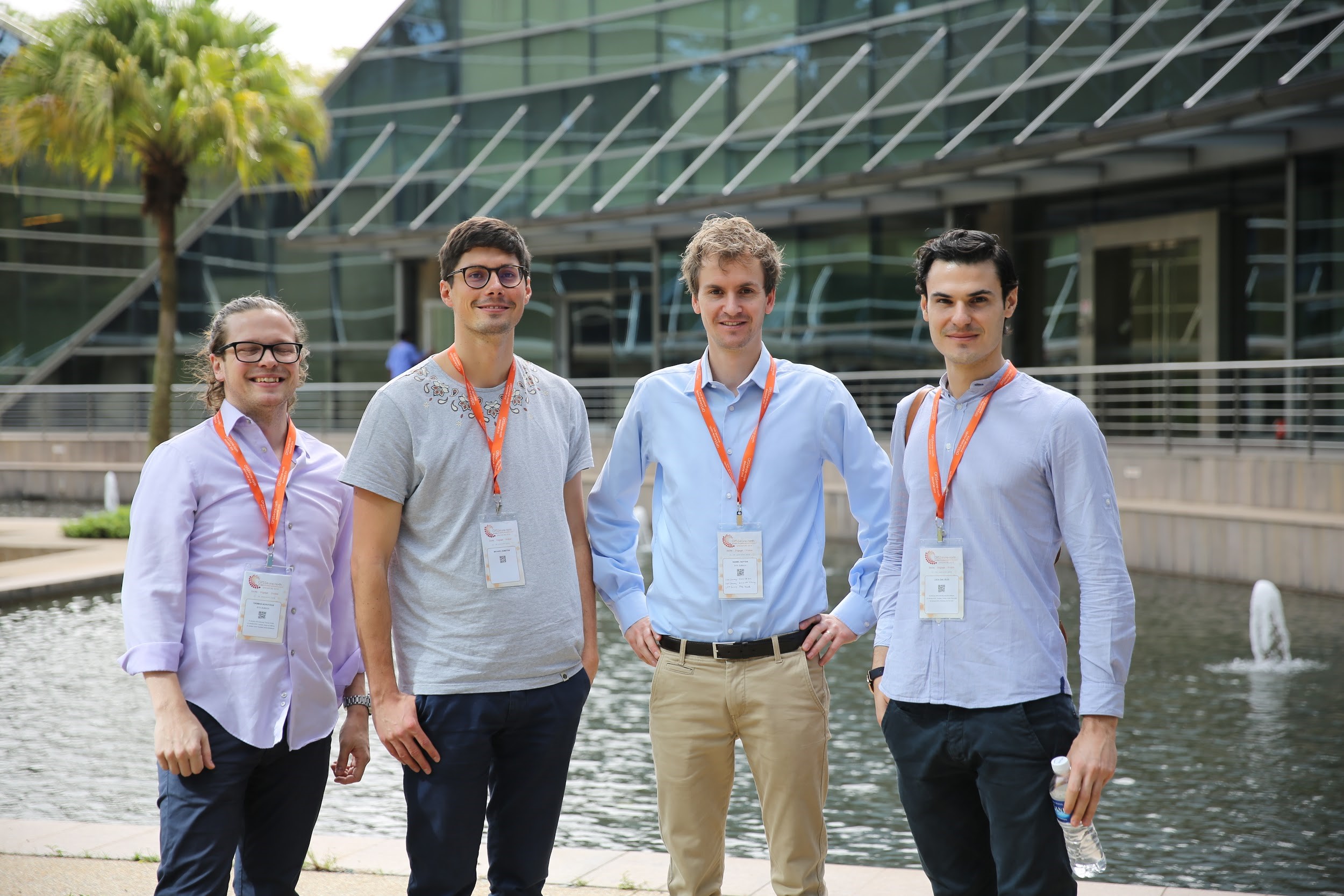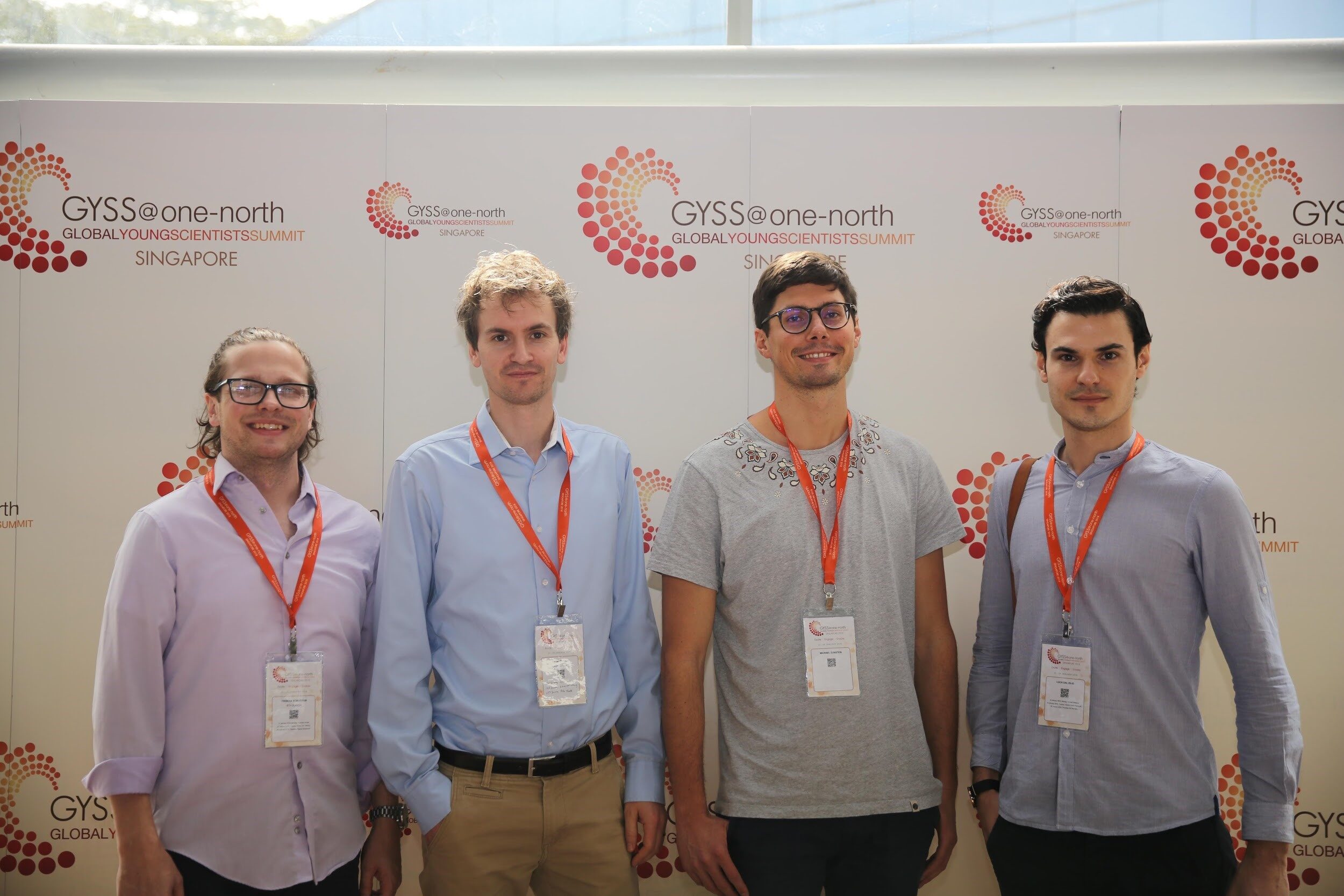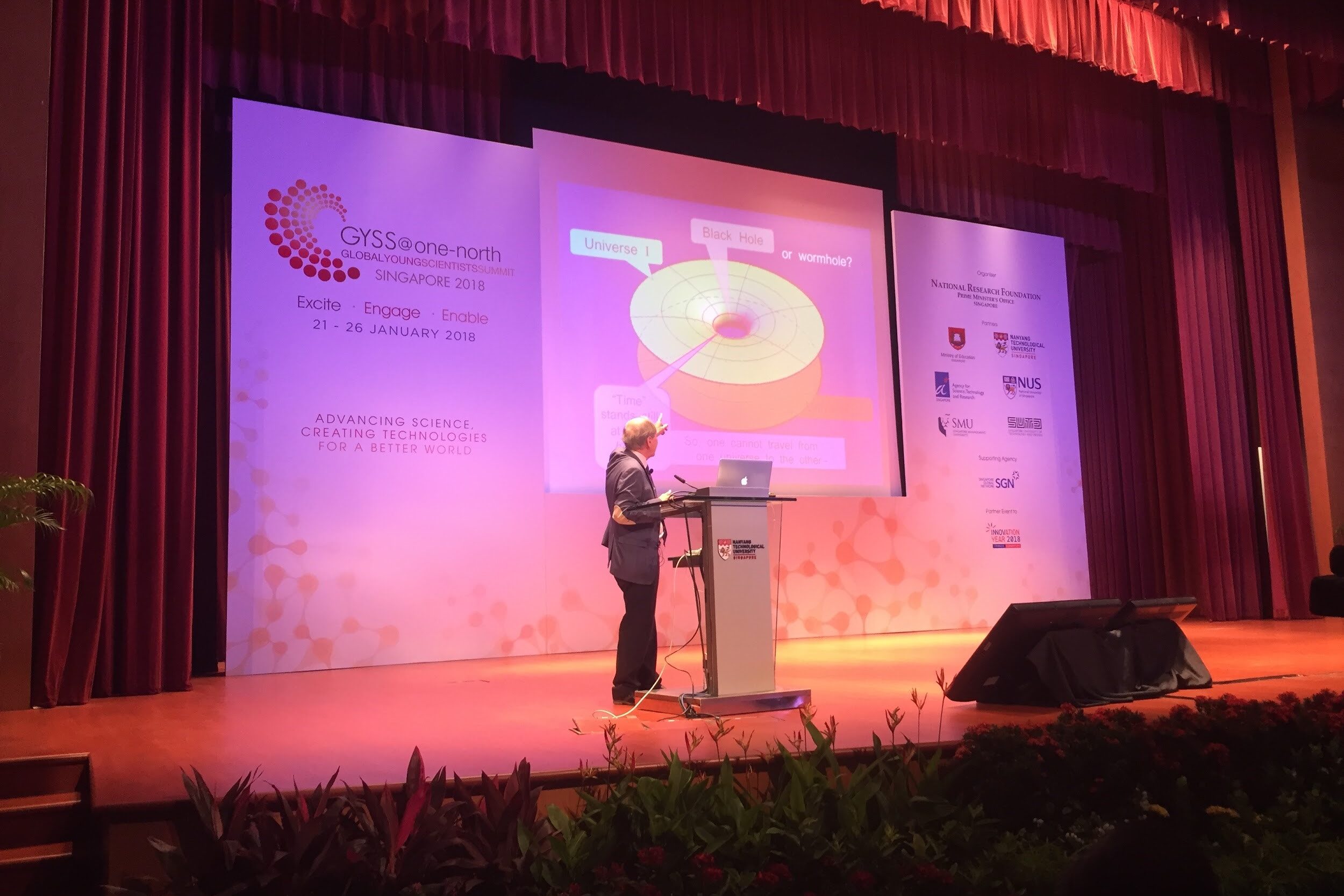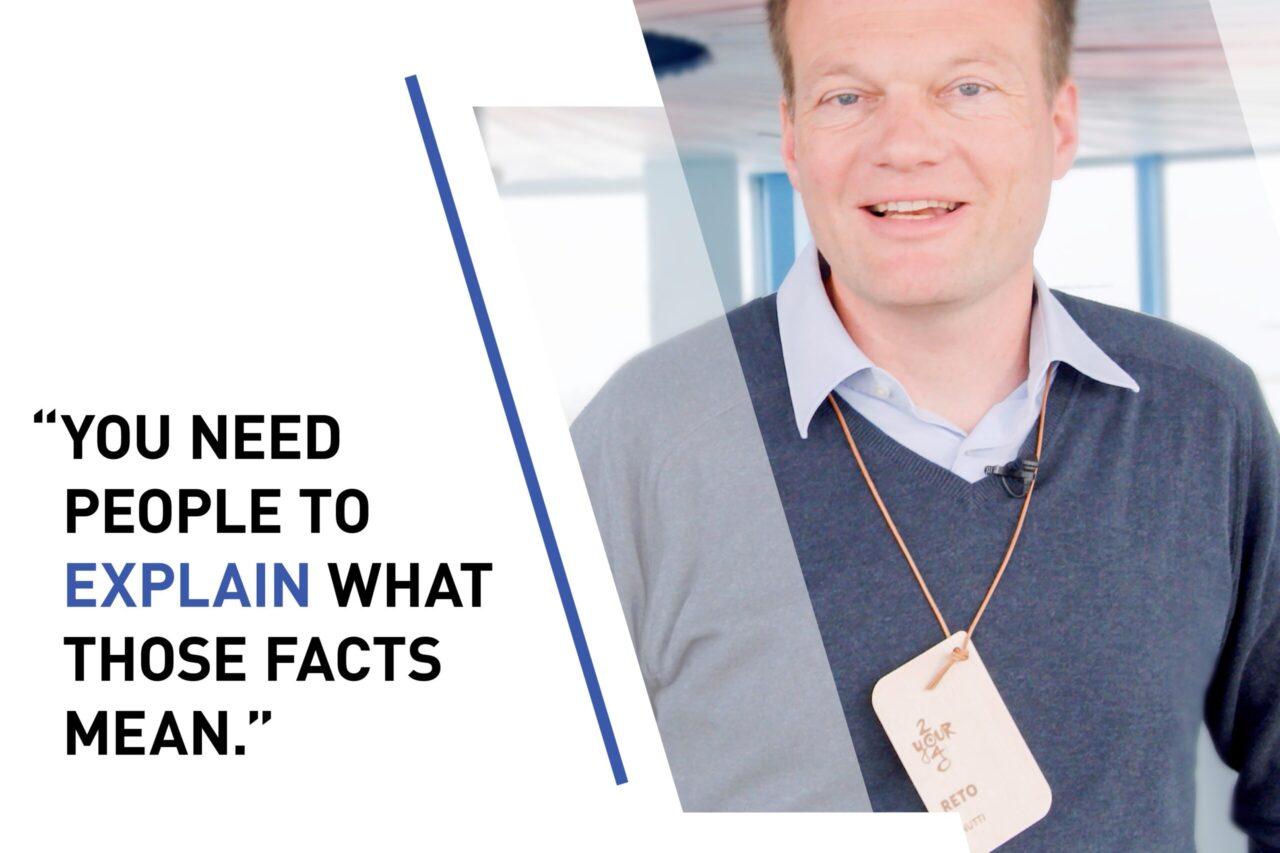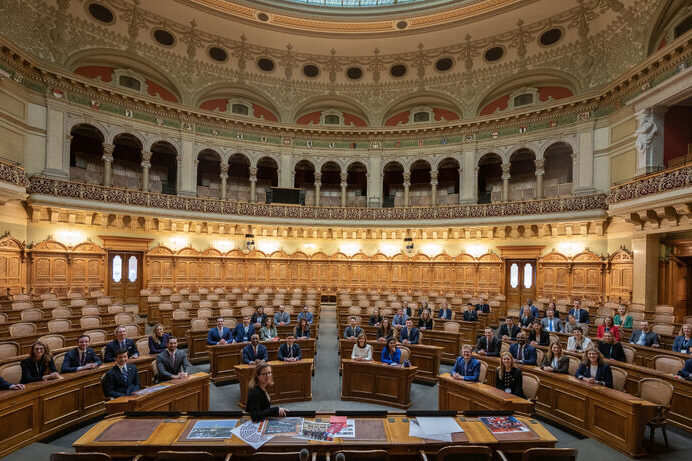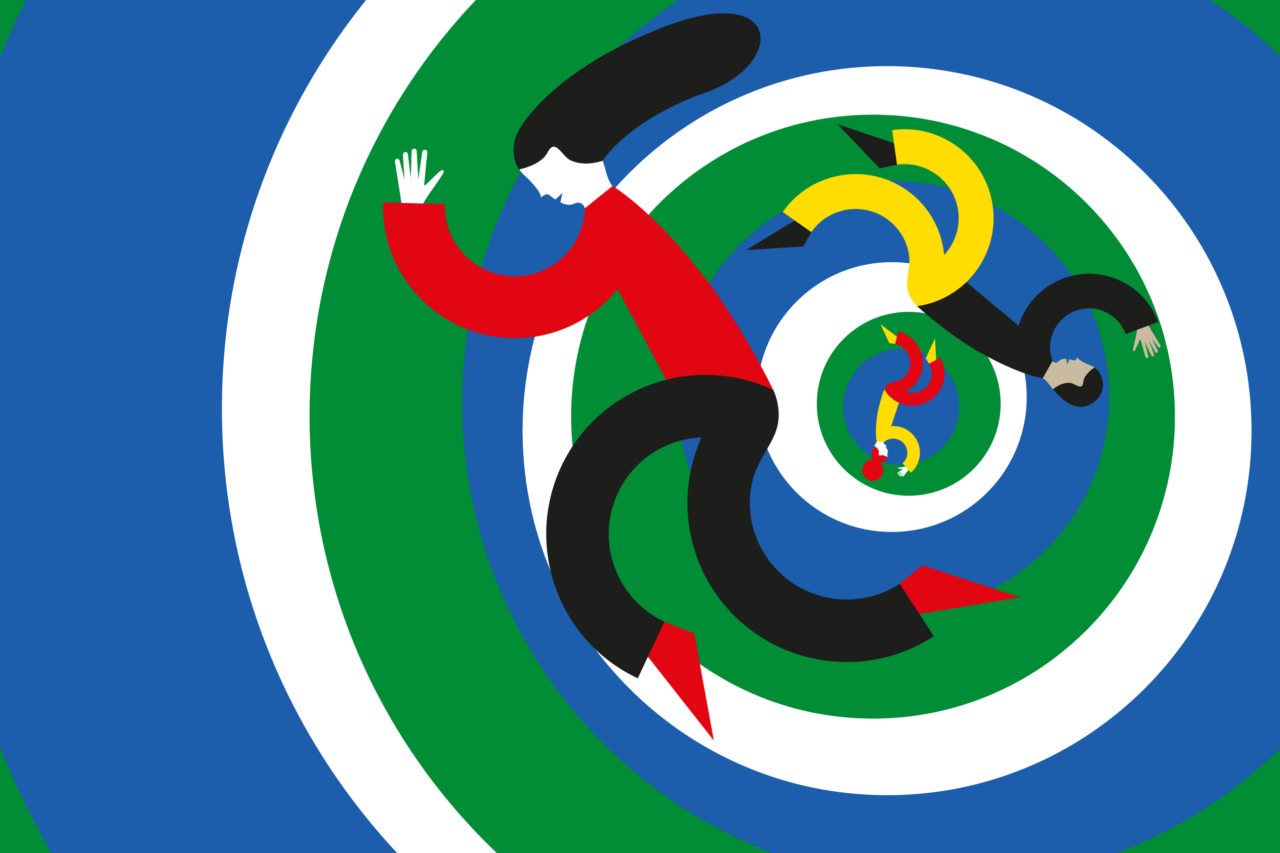In January 2018, Thomas Schutzius, Michael Zumstein, Daniel Sutter and Luca Dal Zilio took part in the Global Young Scientists Summit (GYSS) at the National Research Foundation in Singapore.
More than 280 young researchers, top achievers in their own right, from around the globe gathered in Singapore to seize the opportunity to pick the brains of eminent scientists from multiple disciplines from chemistry to physics and from computer science to engineering. The five-day summit was a chance for young scientists 35 years old and under to interact with their research heroes. The National Research Foundation in Singapore selected four ETH Zurich ambassadors: Thomas Schutzius, Michael Zumstein, Daniel Sutter and me, Luca Dal Zilio (I’m the one on the far right in the photo above) to participate following a multi-stage nomination and selection process.
With its theme Advancing Science, Creating Technologies for a Better World, GYSS focused on key areas in science, research, technology innovation, and society, as well as solutions to tackle global challenges. The format included plenary lectures and small group sessions with these leaders.
My colleague, Thomas, a post-doc in the Thermodynamics in Emerging Technologies Lab, described his experience saying, “The lectures were all inspiring, and it was very interesting to see the different path prominent scientists took in their academic careers. If there was one common theme, it was that they all had excellent teachers. In Sir Tim Hunt’s words ‘…who knew their stuff.’”
In one of the sessions, I had the chance to present our group’s research on the design and fabrication of water repellent materials. I also met many brilliant young scientists at the summit.
From my perspective, as a doctoral student in the Geophysical Fluid Dynamics group, the multidisciplinary nature of the summit was what made the experience great. The exposure to different fields such as biology and engineering was enlightening. Looking at my own field from the perspective of other disciplines gave me some new ideas. Even though I don’t work in engineering and I just have basic knowledge, I followed the lectures and found them interesting. I thought that there was a contrast between the basic fundamental research and the visionary problem solving science, but I was wrong! It is nice to see that there are people who set their sights on the really “big” and important problems of the world. I also had time to visit the National University of Singapore (NUS) and I scope out their current areas of research.
I really enjoyed the opening ceremony and the keynote by Professor Brian Schmidt, who won the Nobel Prize in Physics in 2011. Schmidt spoke about “The Virtuous Cycle of Knowledge.” When he said, “…Our work is built on knowledge from the generation before us,” I felt inspired by the realization that my research can contribute to prosperity in ways I cannot predict.
Professor Gerard ’t Hooft, Nobel Prize in Physics (1999) also gave a great talk. “I’m a theoretical physicist,” he declared. “My job is to focus on what happens when things get very very small; when you understand that, you should be able to integrate the equations and figure out how it works at the bigger scale.”
In a remarkable plenary lecture Sir Michael Atiyah, a Fields Medal winner (1966), asked the audience to ponder on this year’s GYSS theme noting, “The important words are ‘creation’ and ‘better world’. Science and technology are things that enable you to do that!”
Michael, a doctoral student in Environmental Biochemistry shared my opinion.
GYSS 2018 was a great opportunity to learn the stories behind some of the most impactful findings of the last 50 years. It was interesting to observe how personalities and opinions differ in a group of very successful scientists.
Michael particularly summed up his thoughts on GYSS saying, “While Efim Zelmanov – Fields Medal (1994) enjoys thinking about a difficult problem for a ‘very, very long time’, Nobel Laureate, Tim Hunt’s recipe for scientific success is to talk, drink, and dance with other scientists and then just ‘put one foot in front of the other’. Even more important for me was what the speakers agreed on and how they advised young scientists. First, they recommended, that we find our own scientific problem. They said that working on your own problem would be much more rewarding than becoming a copy of your advisor. Second, they encouraged us to believe in our work even though we might not know its true impact until it is finalized or even long after it is over. Third, do not always follow a strict plan. Big scientific discoveries are often the result of unexpected results.
Daniel, who is now a post-doc the Institute of Process Engineering, was excited to get back to Singapore for the first time after his exchange semester at NUS. An exchange program enabled through his ETH Zurich undergraduate studies. The GYSS nomination gave him a second opportunity to visit this spectacular country, but this time for an unforgettable symposium with highly renowned, world-class researchers. Despite the wide variety of scientific disciplines, Daniel observed striking similarities in all of the stories surrounding award-winning research breakthroughs:
All of the researchers highlighted the importance of teamwork and of committed supervision. In the competitive academic world, it is important to realize that time invested in a social life is never wasted. Secondly, “serendipity” generally seems to be a prerequisite. Aside from hard work and planning, many discoveries included an element of fortuity. The ingenuity of the researcher is then to realize this moment of luck, and to observe and explain it.
Daniel’s advice for future GYSS students is to become familiar with some of the speakers and their research in advance and to take advantage of opportunities to approach speakers with questions during coffee breaks.
My ETH Zurich colleagues and I are grateful to those who spent time and effort nominating us as Global Young Scientists. Speaking for all of us, I would like to motivate future ETH Zurich students to seek out the opportunity to attend this and other summit events that afford you the opportunity to learn from those who have successfully walked the academic path before you.
By Luca Dal Zilio
Luca Dal Zilio is a PhD student at ETH Zürich, working at the Institute of Geophysics in the Geophysical Fluid Dynamics Group led by Prof. Paul Tackley and Prof. Taras Gerya. His main research interests lie in numerical modelling of the seismic cycle and plate tectonics, particularly at understanding the relationship between crustal deformation and earthquakes in mountain belts.


